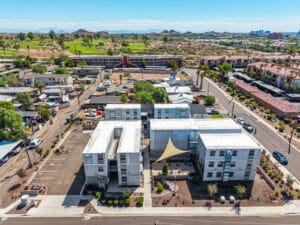The Arizona chapter of NAIOP, a prominent commercial real estate voice in the state, has framed its guiding principles for the 2019 legislative session around public policies that drive demand for commercial real estate in Metro Phoenix and throughout the state.
“In 2019 we intend to promote legislation that positions our state to be the preferred choice for corporate locations and expansions,” said NAIOP Arizona President and CEO Suzanne Kinney. “We also support public policies that encourage the growth of local businesses through entrepreneurship and new business formation.”
Priority issues for 2019 include:
“NAIOP Arizona will support state legislation to clarify and limit the circumstances under which a city may levy the speculative builder tax,” Kinney said. “The current application of the law lacks certainty for building owners and developers and provides a disincentive for redevelopment.”
As always, NAIOP Arizona will oppose legislation that could increase taxes, fees, and regulations for the commercial real estate industry. When it comes to commercial property taxes, NAIOP will work to retain improvements made in recent years and support further action to make Arizona more economically competitive.
The association will also work to ensure that existing economic development tools remain available for projects that create jobs and contribute to regional economic growth. NAIOP will monitor legislative proposals that could impact how state universities use their property in real estate development projects and continue to support those projects that benefit the greater community.
Last year, education was a major focus at the state capitol. NAIOP supported Governor Ducey’s 20 by 2020 plan to increase teacher salaries. More work needs to be done to further improve our public schools at the K-12 and post-secondary levels.
“NAIOP Arizona is working with the broader business community to find sustainable funding solutions that will advance educational outcomes and workforce preparedness without increasing commercial property taxes,” Kinney said. “We will also address current and anticipated future labor shortages in construction and development by supporting Career and Technical Education (CTE) and apprenticeship programs.”
Other issues will include supporting the modernization of transportation infrastructure and working with the Arizona Commerce Authority and other economic development entities to promote private investment in federally-qualified Opportunity Zones.



